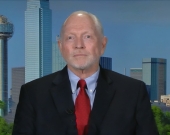Michael Bohlander: The taking of women and girls and selling them into slavery, the way ISIS does in the name of some seriously perverted form of Islam, is an abomination that I as a non-Mus
September 22, 2014
Exclusive Interviews

The Kurdish people have been a shining example of what Islam really means, when they generously gave shelter to non-Muslim refugees.
Gulan: After the Balkan Genocide in the nineties of the previous century, international community in general, and U.S. in particular mentioned that we will never let massacre and genocide crimes to take place again because of difference in ethnic and religious identity. But, currently we have over 1 million internally displaced Christian and Yezidi religion citizens and hundreds have been massacred after rejecting to turn into Islam by Islamic State (IS) terrorists. According to your opinion; how the world has to face this phenomenon in the 21st century?
Bohlander: The 1948 Genocide Convention and the international law principle of Responsibility to Protect (R2P) require States to prevent, stop and punish those responsible for acts of genocide or crimes against humanity. That is the law. Such protection may in some cases require military intervention.
The political reality, however, is that states are not always willing to commit major funds and troops unless they consider themselves in some way threatened. International law is only as strong as the will of the states to enforce it. There is no world police. Rousseau said once:
“I open the books on right and on ethics; I listen to the professors and jurists; and, my mind full of their seductive doctrines, I admire the peace and justice established by the civil order; I bless the wisdom of our political institutions and, knowing myself a citizen, cease to lament I am a man. Thoroughly instructed as to my duties and my happiness, I close the book, step out of the lecture room, and look around me. I see wretched nations groaning beneath a yoke of iron. I see mankind ground down by a handful of oppressors, I see a famished mob, worn down by sufferings and famine, while the rich drink the blood and tears of their victims at their ease. I see on every side the strong armed with the terrible powers of the Law against the weak.” […] “As for what is called the law of nations, it is clear that without any real sanction these laws are only illusions that are more tenuous even than the notion of natural law. The latter at least addresses itself to the hearts of individuals, whereas decisions based on the law of nations, having no other guarantee than the utility of the one who submits to them, are respected only as long as those decisions confirm one’s own self-interest.”
Rousseau, The State of War (1756-1758).
I think Rousseau is still worth reading today.
Gulan: Violence and instability in the failed countries of Iraq and Syria has created a suitable ground for terrorists, as a result the ISIS terrorist organization declared their Islamic State. This situation made it clear that the failed countries are sources to ethnic and religious violence which lead to massacre and genocide. In your opinion, how is it possible to obtain peace and stability for coexistence in the failed states?
Bohlander: That is a very difficult question for someone who lives thousands of miles away and has not undergone the terrible experiences of the people in the region. I cannot presume to have the answer. But I would think that generally the West or any other outside power can only help to establish peace and stability if and when the local population really wants it, and if the rest of the world lets them instead of following their own geo-political aims.
As long as Sunnis and Shi’i and/or believers of other religions fight each other, there will be no peace. ISIS has been declared even by the Grand Mufti of Saudi Arabia as being in “no way part of the faith”, they are heretics, but there needs to be more than just words. The Kurdish people have been a shining example of what Islam really means, when they generously gave shelter to non-Muslim refugees. This process will take time, and the Kurds are well-placed to lead in the efforts.
Gulan: Kurds throughout their history have faced Massacres, Genocide and Chemical bombardments. After the rise of ISIS, more than 300,000 Yezidi Kurds are facing massacre and displacement just because they are different from Islam. Moreover, their women and girls have been taken and been sold by the IS terrorists. What position must the international community have against this humanitarian disaster?
Bohlander: I think I have mostly answered that under question 1 already.
The taking of women and girls and selling them into slavery, the way ISIS does in the name of some seriously perverted form of Islam, is an abomination that I as a non-Muslim think would have made the Prophet Muhammad weep.
Legally, it depends on the circumstances: it can be one form of genocide, but it certainly constitutes crimes against humanity.
Gulan: Due to this disaster, we have more than a million Yezidi and Christians been displaced and have come to Kurdistan Region. Moreover, Kurdistan Region is passing through a difficult war with ISIS fighters who are trying to cross Kurdish border territories. To what extent must the whole world support and help Kurdistan Region in order to rescue many nations from facing Genocide?
Bohlander: The world should help the Kurds (and the Iraqi government) as much as possible, since they are fighting ISIS as the first line of defence for the rest of us. I think governments across the world are waking up to that realisation. It is, however, vitally important that as many Muslim countries as possible join visibly in this effort. I refer to my answer to question 2.
Gulan: After facing Chemical Bombardment in the Halabja town by Saddam Hussein’s regime in the Eighties of the previous century, Kurds have always asked the international community to provide them with a kind of guarantee that prevents Kurds from facing Genocide again. As a result, Kurds have asked the whole world to support Kurdish independent state, so as to preserve its sovereignty and not to face genocide again. Yet, this issue has been ignored until the Kurds faced genocide again. So, to what extent does the world have to support Kurdish independency so that they will not face Genocide disaster anymore?
Bohlander: That is a very sensitive and difficult political question, to which I cannot even offer an attempt of an answer, not least because your geo-political situation as Kurds is very complex, with 4 countries being involved in the potential question of where the territory of such an independent state should be.
I am not sure, however, whether being independent as such would be a sufficient protection against such attacks. Génocidaires are not discouraged just because they may have to cross a state border to carry out their crimes, especially if such borders are difficult to police geographically.
Gulan: The disaster that happened to the Yezidi people and their running to the Singar Mountain in the previous days was being observed by the whole world with grief. In your opinion, to what extent does the world have to recognize this disaster as genocide?
Bohlander: I refer you in that respect to my article on the Conversation webpage.















